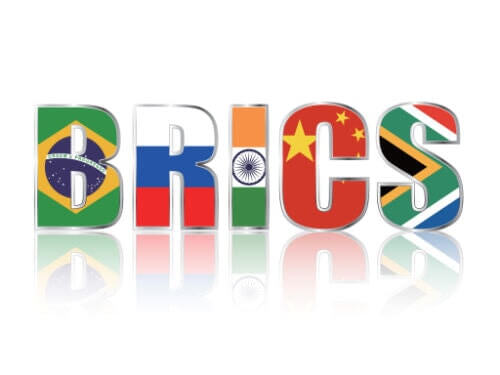
Emerging Markets and the Legal Industry | BRICS
According to 2022 Bloomberg data, India overtook Britain to emerge as the world’s fifth-largest economy. The Indian economy toppled the UK from its position in the last three months of 2021. The report also states, “The International Monetary Fund projected India overtaking the UK this year, placing it just behind the US, China, Japan and Germany. The report further added that a decade ago the Indian economy was 11th largest, while UK’s occupied the fifth position.”
The thought about emerging markets begins with Brazil, Russia, India, China, and South Africa popularly known as BRICS. According to Thomson Reuters, “The BRIC countries were first referred to as such in 2003 when a paper by Goldman Sachs investment bank suggested that their combined economies could outperform those of the G6 in monetary terms by the year 2050. South Africa, also tipped for rapid economic expansion, is the fifth market examined in this article.”
Not just the strong economic growth but there were additional factors that fueled the growth of the legal market in these markets. Factors include culture, politics, education, the internet, the regulatory framework of bar councils, business acumen, and, legal issue management. These along with the underlying Common English Law influenced the penetration of international law firms in these countries.
Through this article, we will examine what makes these markets/countries favourable for the growth of the legal industry and their preparedness to compete in the international market.
The Start:
According to a Summer 2020 paper titled “Globalization, Lawyers, and Emerging Economies: The Rise, Transformation, and Significance of the New Corporate Legal Ecosystem in India, Brazil, and China”,
published by Harvard International Law Journal, “Beginning with the fall of the Berlin Wall in 1989, and continuing through China’s membership in the WTO in 2001, the decade of the 1990s saw many countries around the world begin, or move significantly forward with, a process of transforming from a mostly “closed” economic model to one that is increasingly “open” to the global economy.”
This openness fueled great economic activities in the BRICS countries as they experienced significant foreign direct investment. As traditional economies, these countries rapidly transformed themselves into unexplored legal regimes in areas such as investment and trade, mergers and acquisitions, securities regulation, and competition policy. Further to cope with the growing demand for legal services these countries had just two options, namely:
- Build – a stringent world-class legal education system; or,
- Buy (import) - lawyers from developed countries.
Multiple factors helped the growth of BRICS countries including:
- Government regulations for privatisation and ease of doing business
- Business acumen
- Educated youth population
- Low inflation
- Global Infrastructure
The Legal Education:
BRICS countries are diverse in culture with mostly non-English speaking populations. One of the key challenges was the adoption of English as a common judicial language. Thus, the buy or import option was the easiest but not a long-term solution.
Despite multiple differences and roadblocks, the influence of the U.S. and UK education systems on the BRICS legal education systems can’t be ignored.
In our November 2021 article titled, “Asia Pacific Law Schools Prepare Tech Ready Lawyers”, we highlighted the steps taken by the governments of Asian countries to impart quality legal education and prepare tech-savvy lawyers.
Strong steps including creating English as a common language were taken to create a global legal education system by all the BRICS countries and not just the ones in Asia. Another important driver was the ambition of young lawyers to become global.
The Digital Infrastructure
A February 2022 blog by Vidhi Legal Policy titled “Access to the digital economy in BRICS Countries – Part 1” analyses the availability of the internet in the BRICS countries. Internet usage in BRICS countries is as follows:
- Brazil - 74% overall (74% male and 76% female).
- India – 43% overall as per IAMAI Report (58% male and 42% female).
- China – 70% overall (48.8% female).
- South Africa – 13% population uses mobile internet (67% male and 58% female). There is also a gap in terms of smartphone ownership – 84% male versus 75% females.
Another blog in the series by Vidhi Legal Policy titled “Access to the digital economy in BRICS countries - Part 2”, examines how BRICS countries are responding to the calibration of decent work in the digital economy. The article analyses each BRICS country on:
- Legal recognition of gig workers’ rights
- Protection of algorithm-related workers’ rights
- Legal protection from workplace surveillance
- A right to disconnect
The Future
In Part 2 blog of Vidhi Legal Policy, the writer concludes with the need for the following:
- New rights need to be formalised: This includes rights in the context of algorithmic work management, including rights to transparency, accountability and non-discrimination in work contexts. This also includes a formalised right to privacy at work, and a right to disconnect from work after work hours.
- Existing rights need to be extended to new types of workers: Existing labour rights, such as those of workplace safety, job security, equal pay for equal work, unionisation etc. need to be extended to gig workers based on the de facto full-time nature of their work, and to other informal and casual workers in the digital economy.
In our June 2022 article titled “The Evolving Landscape of Legal Resources”, we brought to light the views of Bob Dolinsky, Principal at Dolinsky Consulting on the feasibility of the legal gig economy. According to Bob, the significant factors that influence acceptance include supply, demand, and client acceptance.
It will be interesting to discover how the BRICS countries overcome their shortcomings and transform.






